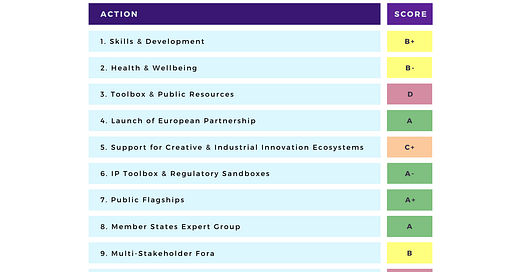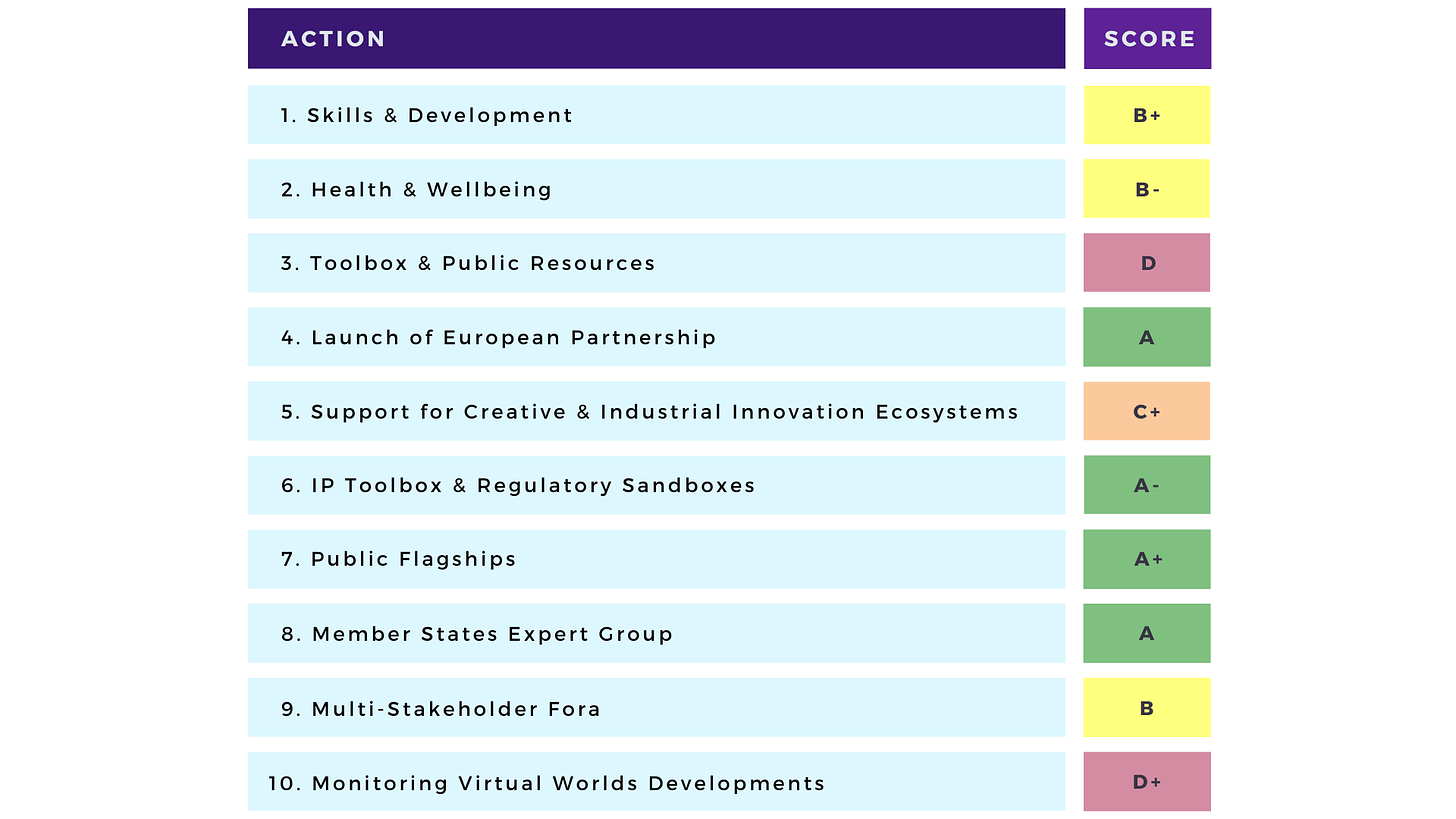In July 2023, the European Commission published its strategy on virtual worlds, to steer the technological transition towards the metaverse. The strategy included 10 actions the Commission committed to undertake before the end of Q3 2024.
One year on, we’re here to check in, and see how things are going!
Action 1: Skills development
{From the strategy} Support skills development for virtual world technologies (Digital Europe programme), including for women and girls, and for creators of digital content and audiovisual professionals (Creative Europe programme) [2024]; and promote the EU as an attractive destination for highly skilled specialists from non-EU countries [Q3 2023]
Our score: B+
In 2023, the European Commission launched tenders to support the development of virtual worlds, which included the allocation of EUR 1.5 million to the “Production of video games and applications based on Virtual Reality (VR) and Augmented Reality (AR) technologies”. In July 2024, the Commission launched a new wave of calls for funding opportunities under the Digital Europe Programmes, allocating EUR 55 million to the development of specialised education programmes on key topics including virtual worlds, and EUR 20 million to support the development of digital twins.
Our take: While we would have liked to see greater, dedicated funding on virtual worlds, and a broader approach to skills, we’re happy to see these investments.
Action 2: Health & wellbeing
Promote the guiding principles for virtual worlds put forward by the Citizen’s Panel and support research on the impact of virtual worlds on people’s health and well-being through Horizon Europe, including specific research on the impact on children’s health and well-being [Q4 2023]
Our score: B-
In April 2024, the European Parliamentary Research Service published an article entitled, “Protecting children in virtual worlds (the metaverse)”, which considered the impact of virtual worlds on children’s health and well-being and highlighted its capacity to enhance children’s learning and development. Despite this research by the European Parliament, the European Commission has not produced any new studies assessing the impact of virtual worlds on people’s health and well-being since its strategy last year.
Our take: The Commission has done an excellent job upholding the spirit of its Virtual Worlds Citizens’ Panel, going so far as to host a feedback session with participants earlier this year. But we would still like to see new dedicated research and funding streams on virtual worlds from HaDEA or similar bodies.
Action 3: Toolbox & public resources
Develop a Virtual worlds Toolbox for the general public, as well as resources on virtual environments for young people under the Better Internet for Kids strategy [Q1 2024]
Our score: D
During the Citizens’ Panel feedback session earlier this year, the European Commission announced a delay of the Virtual Worlds Toolbox to Spring 2024. Yet here we are in September and the toolbox is still nowhere to be seen.
Our take: The Commission took on a considerable task when it committed to develop this toolbox within such a short timeframe. We understand the delays, but hope the Commission will soon release this important resource to advance trust and further the adoption of virtual world technologies by the general public.
Action 4: Launch of European Partnership
Explore, in consultation with Member States, the launch of a new European Partnership to develop an industrial and technological roadmap [Q1 2024]
Our score: A
Concurrently with the publication of the virtual worlds strategy last year, the Commission presented 10 proposals for new candidate partnerships to Member States and Associated Countries – including one on virtual worlds. Since then, the Commission has also explored the idea of a new European Partnership with academics during an information session back in March 2024 and with industry through the VR/AR industrial coalition.
Our take: Hats off to the Commission for prioritising this Partnership, we look forward to seeing how it grows and enables more opportunities for public-private collaboration.
Action 5: Support for creative & industrial innovation ecosystems
Action 5: Support EU Cultural and Creative Industries to test new business models in virtual worlds through Creative Europe [Q1 2024]; foster matchmaking between virtual world developers and industrial users [Q1 2024] and leverage the European Digital Innovation Hubs (EDIHs) and Enterprise Europe Network (EEN) to support virtual worlds hubs and to promote the uptake of new virtual world solutions [Q4 2023].
Our score: C+
Late last year, the Commission launched a call for proposals under the cross-sectoral strand of the Creative Europe Programme to pilot ideas relating to virtual worlds with the potential to change the creative industries, ideally through the use of innovative business tools. However, these authors could not find public information about the Commission’s work to leverage EDIHs and EEN for virtual worlds. There are currently no “virtual worlds hubs” listed on the EDIH registry (though there is incidentally one candidate EDIH in Italy that references the metaverse…)
Our take: A fundamental challenge in developing this scorecard has been tracking down information from so many different Commission initiatives. A revamped webpage on virtual worlds, collating all of the work the Commission has done, would be helpful to see at a glance how the EU is helping to further the EU’s transition towards this technological milestone—and inform stakeholders about upcoming opportunities (until then, the Metaverse EU team will dutifully dig up what we can).
Action 6: IP toolbox & regulatory sandboxes
Support the development of standards for open and interoperable virtual worlds [Q3 2023]; explore the potential of new digital cooperation models [Q4 2023]; develop a toolbox to fight counterfeiting including in virtual worlds [Q4 2023]; and promote the use of virtual worlds regulatory sandboxes by Member States [Q2 2024].
Our score: A-
In March 2024, the European Commission (DG GROW this time, for those keeping track at home) adopted a Recommendation to combat counterfeiting, with a dedicated chapter on adapting IP practices to AI and virtual worlds. The Commission has also remained consistently committed to the use of virtual world regulatory sandboxes since it first started presenting on the strategy, and recently explored the issue in-depth with the AR/VR Industrial Coalition.
Our take: The low-hanging fruit here was the EU toolbox to fight counterfeiting, which we understand was already in development at the time the virtual worlds strategy was published last year. But the Commission’s efforts to promote the use of regulatory sandboxes was significantly more complicated and has been an overall (timely) success.
Action 7: Public flagships
Support public flagships for smart and sustainable cities and communities, CitiVerse, and for the development of the European Virtual Human Twin under the Horizon Europe and Digital Europe programmes [Q4 2023]; and encourage European Digital Infrastructure Consortia (EDICs) in areas relevant to virtual worlds and Web 4.0 [Q4 2023].
Our score: A+
Earlier this year, the European Commission launched a call for tenders for advanced Virtual Human Twins (VHTs) integration and validation models, funded under the Digital Europe Programme and as part of the European Virtual Human Twin initiative. The main objective of this initiative is to develop a distributed platform to develop, test and integrate VHT models. It also set up the The European Digital Infrastructure Consortium (EDIC), which is helping Member States set up digital twins initiatives.
Our take: The Commission has done a good job launching exciting digital twin initiatives to support innovations in health, city governance, and the protection of cultural heritage. Twinning is one of the most immediate opportunities for governments to lead on metaverse technology, and we look forward to seeing even more from the EU.
Action 8: Member States expert group
Bring Member States together to share common approaches and best practices on the development of virtual worlds and the wider technological transition to Web 4.0 through an expert group [Q4 2023]
Our score: A
The first meeting of the expert group on the transition to Web 4.0 and virtual worlds was held in March 2024. There have been two meetings of the steering group since then, including public authorities from each EU Member State.
Our take: Although we’ve heard some Member States have been more enthusiastic about participating in this expert group than others, we applaud the Commission for getting it up and running so quickly, and hope excitement for the metaverse continues to grow as the technologies mature.
Action 9: Multi-stakeholder fora
Engage with existing multi-stakeholder internet governance institutions to design open and interoperable virtual worlds [from Q4 2023]; and support the creation of a technical multi-stakeholder forum to address certain aspects of virtual worlds and Web 4.0 beyond the remit of existing internet governance bodies [from Q1 2024].
Our score: B
The Commission has engaged consistently with its VR/AR Industrial Coalition and and used this platform to reach a range of stakeholders. At the beginning of 2024, OpenVerse (an EU-funded initiative) launched as a technical multi-stakeholder forum to guide the development of virtual worlds. Earlier this year, the European Commission launched a call for tenders for a pilot project aimed at virtual worlds and the transition to Web 4.0 (Metaverse EU joined others in this space in our disappointment at how short the application window was for this call and how quietly it was promoted).
Our take: Industry has a lot to contribute to the discussion on virtual worlds and is generally eager to engage with policymakers. The EU should hasten its efforts to engage not only through its own existing channels but with wider international fora (Metaverse EU often notes the EU’s absence in international working groups in IEEE, WEF, and MSF) and integrate multi-stakeholder perspectives on the metaverse to encourage mutual learning opportunities.
Action 10: Monitoring virtual worlds developments
Launch a structured approach to monitor the development of virtual worlds across all industrial ecosystems together with Member States and stakeholders [from Q1 2024].
Our score: D+
When the European Parliament Internal Market Committee report on virtual worlds was adopted at the start of 2024, it applauded the European Commission’s commitment to monitor the development of virtual worlds and suggested to regularly report on its progression. However, now well past the Q1 deadline, the Commission has still not publicised how it intends to monitor the development of virtual worlds across industrial ecosystems.
Our take: A structured approach to monitoring the development of technological progress—such as the EU’s Digital Decade targets—create concrete, accountable targets and allow policymakers to take stock of where attention is most needed. We support the idea the Finnish Metaverse Initiative of a “Metavese maturity index”. Perhaps the incoming 2024-2029 Commission will be able to provide us with more clarity on this point. Stay tuned…
Overall thoughts
Although many of the initiatives the European Commission committed to in its inaugural strategy were delayed, we are impressed to see so much progress on a topic that many doomed to the hype cycle. Moreover, we have seen new initiatives relating to virtual worlds beyond the scope of this strategy, such as grants for SMEs working on virtual worlds under the European Innovation Council’s Accelerator programme and DG Competition’s call for contributions on competition in virtual worlds and follow-up workshop.
However, we were disappointed to see no mention of virtual worlds in either Ursula von der Leyen’s political guidelines for 2024-2029 or the European Council’s new Strategic Agenda. We urge the EU to not lose sight of the metaverse’s potential, to complete the initiatives from its July 2023 strategy and to begin work drafting new commitments for the next mandate. More on that soon ⏳



